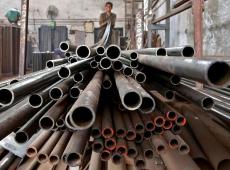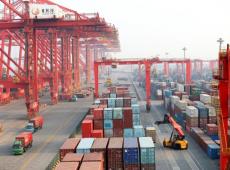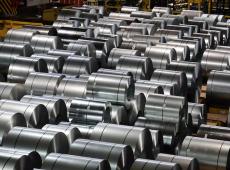India's Tariffs: Why Industry Wants Higher Duties Despite Reductions
By Rediff Money Desk, New Delhi Dec 11, 2024 16:17
India's tariff reduction to world average level sparks debate as industries push for higher duties. DPIIT Secy questions competitiveness and seeks to examine reasons behind the requests.
New Delhi, Dec 11 (PTI) India has reduced its tariffs significantly over the years, bringing them down to the world average level, yet the domestic industries continue to suggest increasing the duties, a senior government official said on Wednesday.
Secretary in the Department for Promotion of Industry and Internal Trade Amardeep Singh Bhatia said that it needs to be examined why such requests come.
"On the export market side and integration with the (global) supply chains, there is also a lot of work which has been done in terms of reduction in tariff, the weighted tariff has come down substantially and it is almost at the world average level. But of course, there are pressures that it should be increased by the domestic industry, which we need to look at why these requests keep coming up. Why are we not competitive enough," he said.
India has also free trade agreements with different countries to push exports.
The Secretary was speaking at CII's Global Policy Forum 2024.
Cut in customs duties on raw materials help boost domestic manufacturing, create jobs and push exports.
Tariffs have been reduced in different sectors such as electronics, precious metals and chemicals.
He added that the Viksit Bharat 2047 targets would lead to enhanced investments in the private sector such as clean energy.
The government has taken a series of measures to promote ease of doing business in the country.
"A lot has been done in the industrial infrastructure space. There are more than 4,000 industrial parks in the country," Bhatia said, adding some states are doing good in making available land for industrial purposes.
"We will have consultations and see what more can be done (at the land front)," he said.
Some states like Tamil Nadu have put in place "very good" practices like putting in place land pooling systems to bring more industrial land, the secretary said.
Speaking at the session, Rakesh Bharti Mittal, Vice Chairman, Bharti Enterprises (India), said that the high cost of doing business in India bothers the industry and more needs to be done to promote ease of doing business at the states' level as things on the ground do not move the way it should.
On this, Bhatia said that the Business Reforms Action Plan (BRAP) is there to assess the work of states at the ease of doing business.
"There are about 280 reform actions identified and are part of the BRAP...We have a bucket of good practices which we share with all...Odisha and Telangana have good single-window systems. So things are happening.
Obviously there are gaps and much more can be done at the states' level," he added.
Secretary in the Department for Promotion of Industry and Internal Trade Amardeep Singh Bhatia said that it needs to be examined why such requests come.
"On the export market side and integration with the (global) supply chains, there is also a lot of work which has been done in terms of reduction in tariff, the weighted tariff has come down substantially and it is almost at the world average level. But of course, there are pressures that it should be increased by the domestic industry, which we need to look at why these requests keep coming up. Why are we not competitive enough," he said.
India has also free trade agreements with different countries to push exports.
The Secretary was speaking at CII's Global Policy Forum 2024.
Cut in customs duties on raw materials help boost domestic manufacturing, create jobs and push exports.
Tariffs have been reduced in different sectors such as electronics, precious metals and chemicals.
He added that the Viksit Bharat 2047 targets would lead to enhanced investments in the private sector such as clean energy.
The government has taken a series of measures to promote ease of doing business in the country.
"A lot has been done in the industrial infrastructure space. There are more than 4,000 industrial parks in the country," Bhatia said, adding some states are doing good in making available land for industrial purposes.
"We will have consultations and see what more can be done (at the land front)," he said.
Some states like Tamil Nadu have put in place "very good" practices like putting in place land pooling systems to bring more industrial land, the secretary said.
Speaking at the session, Rakesh Bharti Mittal, Vice Chairman, Bharti Enterprises (India), said that the high cost of doing business in India bothers the industry and more needs to be done to promote ease of doing business at the states' level as things on the ground do not move the way it should.
On this, Bhatia said that the Business Reforms Action Plan (BRAP) is there to assess the work of states at the ease of doing business.
"There are about 280 reform actions identified and are part of the BRAP...We have a bucket of good practices which we share with all...Odisha and Telangana have good single-window systems. So things are happening.
Obviously there are gaps and much more can be done at the states' level," he added.
Source: PTI
Read More On:
DISCLAIMER - This article is from a syndicated feed. The original source is responsible for accuracy, views & content ownership. Views expressed may not reflect those of rediff.com India Limited.
You May Like To Read
TODAY'S MOST TRADED COMPANIES
- Company Name
- Price
- Volume
- Vodafone Idea L
- 7.99 (+ 1.52)
- 58018780
- Mishtann Foods L
- 9.17 ( -5.17)
- 27555831
- Shree Securities
- 0.42 ( -6.67)
- 27309223
- AvanceTechnologies
- 0.90 ( -4.26)
- 25537567
- Rajnish Wellness
- 1.69 ( -2.87)
- 19267607
MORE NEWS

Zepto Cuts Losses, Revenue Doubles in FY24
Quick commerce firm Zepto narrowed its losses to Rs 1,248.6 crore in FY24, while...
KKR Sells 2.6% Stake in India Grid Trust for Rs...
Private equity firm KKR has sold a 2.6% stake in India Grid Trust for Rs 277 crore...

MFN Clause Suspension: India Needs Strategic...
Switzerland's suspension of the MFN clause in its tax treaty with India highlights the...












 © 2024 Rediff.com India Limited. All rights reserved.
© 2024 Rediff.com India Limited. All rights reserved.